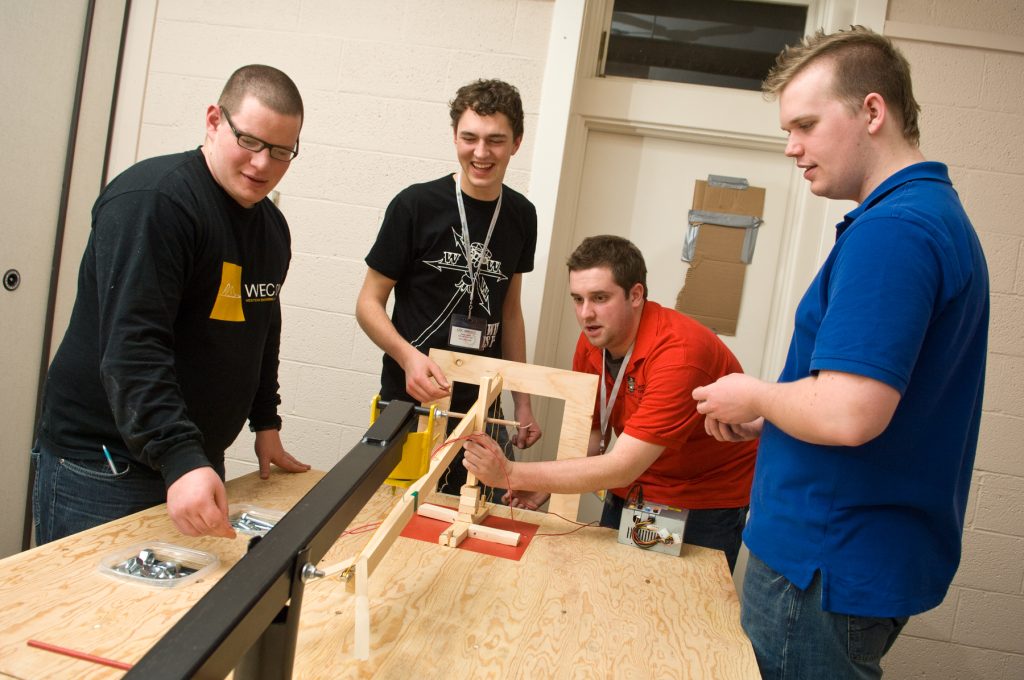We’ve all heard it before: “I can’t, I’ve got engineering homework.” It’s a long-standing excuse made by engineering students, but how much truth is there to the claim that engineering is the hardest program at the University of New Brunswick?
“The workload is a lot,” said Parker Chesley, a second-year student in the program.
He said engineering students have three to five assignments a week, plus tests, quizzes, and lab papers. These requirements increase dramatically during midterm and exam seasons.
Michel Couturier, a chemical engineering professor, said engineering has a minimum of 160 credit hours over four years, which equates to over 40 credit hours per academic year– more than any other program. UNB is home to Canada’s oldest engineering faculty.
“In my opinion engineering is the most demanding program at any university,” he said.
The program may be challenging, but when it comes to drop out rates, engineering is ahead of other faculties.
Frank Collins, assistant dean of engineering, said the retention rate from first year to second is around 89 per cent. That’s higher than the university’s overall retention rate of 79.6 per cent.
“This is quite high in comparison to some programs at UNB, and it’s even high among most engineering schools,” Collins said.
Couturier said the intensive program is required because UNB’s engineering programs are accredited by Engineers Canada. This accreditation means that when UNB engineering students graduate, they can apply directly to an association to become junior engineers without having to take numerous certification tests to prove they meet the qualifications. To be an accredited school, Couturier said a university must meet or exceed the standards set by Engineers Canada.
Couturier said UNB students have the opportunity to extend the program to last more than four years.
“That’s one advantage of flexibility: in schools with compulsory co-op this is not possible,” he said.
Extending a degree program does not completely solve a student’s workload issues, however. Chesley noted that in his first year there were peer-assisted learning sessions offered for classes, but after first year that support was no longer offered. Even getting tutors for engineering courses is notoriously difficult. Why? Tutors have all got their own homework to deal with.
“I know a couple people have dropped engineering because it was too much for them and not what they thought it was,” Chesley said.
Collins said the engineering program’s strong retention rate is linked to changes introduced about a decade ago. The engineering curriculum was adapted to better build upon skills students had gained in high school, and the faculty has put a special focus on the transition into university and academic life.
The engineering program introduced ‘UNBetween:’ a week-long, transition-to-university camp that is held twice each summer. According to Collins, students who attend this camp generally do 10 per cent better than students who don’t attend.
He said the experience of young engineering students is changing constantly.
“We continue to watch, listen and work with students and instructors to make things better,” Collins said.
Kathleen O’Connor, a first-year civil engineering student, said she still feels the program is designed to overwhelm students “to see who’s strong enough to stick with it.”
O’Connor said she’s had to learn to accept failure.
“Almost every student experiences failure to some degree during engineering. If someone is the kind of person that gets highly discouraged by failure then it’s probably not the program for them; it kind of taught me that sometimes when things go poorly you just have to accept it and keep trying,” she said.
A common critique of not only engineering, but most STEM (science, technology, engineering and mathematics) programs, is the lack of opportunities for women and gender discrimination.
Alex Morrell, a first-year engineering student, said she’s definitely experienced engineering differently as a woman.
“I notice in group work the men don’t really listen to you like they do the other men,” Morrell said. “I’ve contributed ideas but they’ve been disregarded until a guy says the same thing– then it’s a good idea.”
Morrell said she has had certain professors treat her and her female classmates the same way, preferring male students over women.
Couturier said there is a national effort by Engineers Canada to increase the percentage of women in engineering by 30 per cent by 2030. He said most engineering programs have about 20 per cent female enrollment, with only chemical engineering reaching anywhere near an equal ratio of men and women.
Couturier noted that some common issues which prompt students to drop out or change faculties are the misconceptions surrounding engineering as a program. Many students go into the faculty thinking that it will be like doing a science degree, but Couturier said there’s no similarity.
“Engineering is not science, it’s applied science,” he said. “If you were to eliminate everything that engineers do – you’d be out in the forest, naked. Engineering is about not only understanding science; it’s about using it to impact society.”
Is an engineering degree worth it?
Couturier said starting wages for a junior engineer are upwards of $60,000, a strong incentive for students to stick it out.
“If it was easy, everyone would do it,” Chesley said.
UNB offers chemical, civil, electrical, geomatics, geological, mechanical, and software engineering streams.




